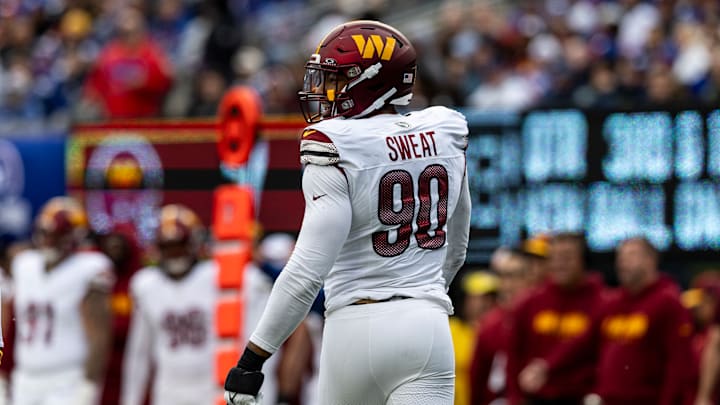Life isn't easy for the Green Bay Packers this season. Their lone move at the trade deadline was to trade away starting cornerback Rasul Douglas.
Fans won't love it, but at least there is logic to the decision. The Packers feel they need to add draft capital to rebuild the roster. By the time they have a team ready to contend, Douglas would likely be gone anyway.
The same can't be said for the Chicago Bears. They traded a second-round pick to the Washington Commanders for edge rusher Montez Sweat, who is a free agent in the offseason.
Bears GM Ryan Poles made the deal without agreeing a long-term extension with Sweat, which means they could lose their new pass rusher after only nine games. Sweat isn't committed to re-signing with the Bears, and why would he?
Newest Chicago #Bears DE Montez Sweat indicated that he’s not currently ready to sign an extension. “I just want to consider everything around me before I make a decision.” 😳
— Ben Devine (@Chicago_NFL) November 1, 2023
It leaves the Bears in an awkward position, and one they easily could've avoided.
Ex-Packers executive Andrew Brandt is baffled by Bears trade deadline move
Andrew Brandt was part of the Packers' front office from 1999-2008. He negotiated Aaron Rodgers' rookie contract in 2005.
During an appearance on the Ross Tucker Podcast, Brandt spoke about his surprise that the Bears traded for Sweat without working out a long-term extension first.
"How do you give up that big an asset and not have a companion contract extension? I don't get it," said Brandt. "What are the Bears doing? What is Montez Sweat going to be for them?"
"If they went and said, 'Hey, we're going to trade for you, but we need a contract,' and the only way the trade went through is with a contract, which is what the smart teams do, they would've had one by now."
"What are the Bears doing??@AndrewBrandt doesn't understand the trade for Montez Sweat: pic.twitter.com/Z80ebAwcfN
— Ross Tucker Podcast (@RossTuckerPod) November 1, 2023
He's spot on.
The Bears have no better shot at agreeing to a long-term deal with Sweat in the offseason than any other team unless they use the franchise tag. But the tag means paying top pass-rusher money to Sweat, which would be a massive overpay.
As Brandt points out, all the leverage goes to Sweat. The Bears have to hope he stays on a long-term deal after investing a high second-round pick during a losing season. If not, they will lose him after only nine games after giving up premium draft capital.
Sweat can raise his contract demands and simply walk away in the offseason if the Bears don't pay him what he wants. Chicago could've avoided that situation by only making the trade if a long-term deal was agreed. And if Sweat refused, fine. Walk away from the trade.
The Bears put themselves in a tough spot.
Ryan Poles wasted a second-round pick in a trade for Chase Claypool last season. He played 10 games for the Bears before they traded him to the Miami Dolphins for a sixth-round selection.
They now run the risk of wasting another second-rounder at the trade deadline. As bad as things have gotten for the Packers, at least they aren't making decisions as bad as the Bears.
